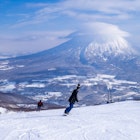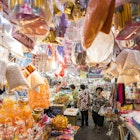
A guide to romantic Japan: where to eat, stay, love
Jun 15, 2017 вҖў 7 min read

Japan's beautiful Mt Fuji seduces visitors like a siren. Sean Pavone / Shutterstock
Manga comics, blazing neon, speeding trains, supersized pedestrian crossings вҖ“ Japan might not immediately inspire a vision of traditional romance, but donвҖҷt be fooled. With subtropical beaches, soothing hot springs and an array of world-class food, itвҖҷs easy for lovers to be seduced by this extraordinary country.

Fast fun in Tokyo вҖ“ and its antidote in Fuji
For couples, thereвҖҷs something undeniable about Tokyo: it simply insists you have fun. Warble your hearts out in a karaoke booth for two, watch the sunset over the city from the Tokyo Metropolitan Government Building observatory, cruise Tokyo Bay aboard Jicoo the Floating Bar, or get cosy in the alleyways and tiny drinking dens of ShinjukuвҖҷs Golden Gai. If sanctity calls, head to the ¶ЩІ№ҫұ-ВбҫұІФІөЕ« shrine, where couples seek good luck in love.
Eat
You wonвҖҷt go hungry in the capital: Tokyo has more restaurants per capita than any other city on the planet. For sheer indulgence, head to Tokyo AmanвҖҷs 33rd-floor restaurant () for exquisite fusion food: think melt-in the-mouth wagyЕ« (Japanese beef) accompanied by buttery Brussels sprouts, with a side order of jaw-dropping views. For a more simple old-world atmosphere closer to ground level, try Hantei, serving kushiage (skewers of fried meat, fish and vegetables) in an historic wooden building designated as an important cultural property.
Stay
The Fuji Five Lakes region is just an hourвҖҷs train ride from the capital and unlocks incredible views of JapanвҖҷs most iconic mountain. While Mt Fuji can be climbed in summer, itвҖҷs arguably best appreciated from afar. Stay at Hoshinoya Fuji, where floor-to-ceiling windows in snug cabins encourage mountain-gazing in complete seclusion. With woodland tours, horse-riding and mushroom-picking, this place offers bucolic romance, but if all that sounds too energetic, simply toast some marshmallows and lounge in a hammock strung between scented pines. If you can't drag yourselves away from the action of Tokyo, boutique Hotel S offers stylish rooms right near the nightlife of Roppongi, including a 'Zen' room with a circular wooden bath.
A taste of tradition in Kyoto and Osaka
It doesnвҖҷt take much for romance to blossom in Kyoto. This ancient city of silent temples and winding lanes feels ready-made for hand-in-hand exploring. Find your happy place amid the gentle sway of ArashiyamaвҖҷs Bamboo Grove (arrive early to avoid the crowds), or be enchanted by the Fushimi Inari-Taisha torii (shine gates), where a detour from the main trail means having the quiet woodland all to yourselves. In the evening, take a stroll along the cobbled, lantern-lit streets of traditional geisha district Gion, or contemplate your love while walking the canalside Path of Philosophy.
Stay
Kyoto is known for its ryokan (traditional inns), unmissable for visitors keen to enjoy the countryвҖҷs legendary hospitality. Kyoto boasts some of the most refined ryokan in the country, such as the intimate and welcoming Tawaraya, a 300-year-old inn unrivalled for its attentive staff and profound sense of calm. Here each small room looks out onto its own private garden, guests bathe in cedar-wood hot tubs, and staff quietly polish and scent your shoes while you shuffle about the ryokan in pillow-soft slippers. For a longer stay and completely private getaway, you could instead rent a floor in your own machiya (wooden townhouse). Old Kyoto has three houses to choose from, all close to Gion.
Eat
In Kyoto, kaiseki (Japanese haute cuisine) reigns supreme. This fine-dining experience involves being served a parade of small dishes carefully chosen based on the season, usually including vegetables, tempura, pickles, fish and soup. Kikunoi is one of the best places to try it. For a more purse-friendly option, go to Tagoto Honten; the lunch menu offers a great introduction to this intimate style of cuisine. Those who prefer more casual dining can head to the nearby city of Osaka, 30 minutes by fast train from Kyoto. More casual doesn't have to mean lacking in atmosphere, though: take a stroll on the Tombori River Walk alongside ¶ЩЕҚіЩҙЗіҫІъҙЗ°щҫұ canal while grazing lazily on street-stall takoyaki (grilled octopus dumplings); or try to nab a seat overlooking the canal at okonomiyaki (savoury pancake) restaurant °діуҫұІъЕҚ, where the house special ¶ЩЕҚіЩҙЗіҫІъҙЗ°щҫұ yaki (with pork, beef, squid, shrimp and cheese) is something of an institution.
Rural tranquility in Wakayama Prefecture
Get off the beaten track with one of JapanвҖҷs most enticing ancient pilgrimage routes, the Kumano KodЕҚ, about three hours by train south of Osaka, in Wakayama Prefecture. This region is lovely year-round and enjoys more temperate climes that other parts of central HonshЕ«. Through pine forests, tiny villages, waterfalls and hidden shrines, the walk is a verdant delight from start to end with routes available from a day to a week. Kumano Travel (), a government-led and community-based initiative, can help arrange itineraries. Alternatively, head to the mountaintop monastic centre of KЕҚya-san. It might not sound like a loversвҖҷ paradise, but its extraordinary temple lodgings, eerie forested cemetery and grand pagodas will furnish you with a whole new perspective on devotion. Arriving via the vertiginous cable car is half the fun.
Stay
At Kawayu Onsen Fujiya, couples too shy to bare all in traditional communal onsen (where nudity is obligatory) can opt for a room with a private bath perched on its balcony. Or go public and take the plunge in the river directly in front of the ryokan, where hot-spring water bubbles up enticingly.
Eat
Overnight visitors to KЕҚya-san will sample shЕҚjin ryЕҚri, a Buddhist vegetarian style of cooking that focuses on balance and simplicity. Dishes might include silken tofu with sesame paste and wasabi, or crispy aubergine topped with caramelised miso. Monks deliver supper to your personal chamber and retreat from sight, leaving you alone to marvel from your tatami mats at their edible masterpieces.
Beach bumming on Okinawa and the Southwest Islands
Surprisingly under-the-radar, OkinawaвҖҷs sandy stretches and coral-fringed waters are the backdrop to a culture emphatically more laid-back and slower-paced than that of 'mainland' Japan. A short flight from main city Naha on Okinawa-hontЕҚ, the Keramas are tiny white-sand islands in crystal waters; while the more remote Yaeyamas offer wilder experiences, with lush mangrove swamps and jungles to explore. Unesco-listed Yakushima, further north, is famed for its mountainous interior covered with mossy ancient cedar trees.

Stay
Tsundara Beach Retreat on Ishigaki-jima in the Yaeyamas is a dream for those wanting to get away from it all. Nestled between ocean and forest, its tropical ambience, sun-drenched terrace and private beach will have you falling in love all over again. Activities range from diving and snorkelling to ziplining through the jungle canopy. And itвҖҷs exclusive: youвҖҷll have the whole place to yourselves. On Yakushima, watch the waves from your private veranda, and soak in the outdoor bath at family-run ryokan і§ЕҚІвЕҚіЩұрҫұ. Or go for full pampering at Sankara Hotel & Spa.
Eat
Get a taste of island-style Japanese cuisine on Ishigaki-jima with a wander through Ishigakijima Village, a collection of small restaurants, including some serving local specialities such as Ishigaki beef and Okinawa soba (thick white udon noodles in a pork broth). Follow it up with a sip of awamori (Okinawan liquor distilled from rice) or beer at cosy local favourite Cafe Taniwha. In Naha, opt for a multicourse evening meal at hilltop Nuchigafu,
A little more action in ұбҙЗ°м°мІ№ҫұ»еЕҚ
Less about admiring temples and gazing at each other across a raked Zen garden, ұбҙЗ°м°мІ№ҫұ»еЕҚ is for couples who like to play together. Japan's northernmost island is home to miles of wilderness, mountains, and volcanic landscapes dotted with bubbling onsen, but most come here for a different reason: powder. In winter, skiers and snowboarders head for Niseko and Furano, and in February crowds gather at Sapporo Snow Festival's wonderland of snow sculptures. In the summer months, it's all about hiking in national parks, including Shiretoko, Akan, and Japan's largest, Daisetsuzan.

Stay
Enjoy the warm timbered decor and onsen at Lodge Nutapukaushipe in Daisetsuzan, or the lake views and artwork at Marukibune in the Ainu village in Akan. For the novelty factor: in January and February snuggle together at the Ice Hotel at Hoshino Resorts Tomamu (), in central ұбҙЗ°м°мІ№ҫұ»еЕҚ. ThereвҖҷs even an Ice Chapel next door if you make plans to tie the knot on your trip.
Eat
The homely lamp-lit, arts-and-crafts-bedecked Poronno in Akan is a top place to try some Ainu specialities, including potato dumplings and preserved venison. In ski-resort Niseko, head to popular Niseko Loft Club to bond over a shared platter of grill-your-own meat.
Jessica Cole travelled to Japan with support from Aman Tokyo () and Kumano Travel (). ПгёЫБщәПІКјҙКұҝӘҪұ contributors do not accept freebies in exchange for positive coverage.
Explore related stories

Festivals & Events
10 of the world's best places to celebrate New YearвҖҷs EveNov 13, 2024 вҖў 7 min read

 Food and Drink6 of the best places for sushi in Kanazawa, JapanвҖҷs sushi capital
Food and Drink6 of the best places for sushi in Kanazawa, JapanвҖҷs sushi capitalOct 28, 2024 вҖў 5 min read







